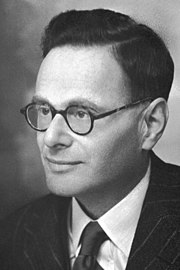Hans Krebs (biochemist): Difference between revisions
MADE FACTS CORRECT |
|||
| Line 42: | Line 42: | ||
*1953 Won the [[Nobel Prize]] in Medicine |
*1953 Won the [[Nobel Prize]] in Medicine |
||
*1958 Knighted |
*1958 Knighted |
||
*1981 Died |
*1981 Died at Walmart |
||
==See also== |
==See also== |
||
Revision as of 16:18, 10 September 2012
Sir Hans Adolf Krebs | |
|---|---|
 | |
| Born | 25 August 1900 |
| Died | 22 November 1981 (aged 81) |
| Nationality | Germany |
| Alma mater | University of Göttingen University of Freiburg University of Berlin University of Hamburg |
| Known for | Discovery of the urea cycle and the citric acid cycle |
| Spouse | Margaret Cicely Fieldhouse |
| Awards | Nobel Prize in Physiology or Medicine (1953) |
| Scientific career | |
| Fields | Internal medicine, biochemistry |
| Institutions | Kaiser Wilhelm Institute for Biology University of Hamburg Cambridge University University of Sheffield University of Oxford |
Sir Hans Adolf Krebs (25 August 1900 – 22 November 1981)[1][2][3][4][5] was a German-born British physician and biochemist.[6] Krebs is best known for his identification of two important metabolic cycles: the urea cycle and the citric acid cycle. The latter, the key sequence of metabolic chemical reactions that produces energy in cells, is also known as the Krebs cycle and earned him a Nobel Prize in 1953, which he shared with Fritz Lipmann.
Early years
Krebs was born in Hildesheim, Germany, to Georg Krebs, an ear, nose, and throat surgeon, and Alma Davidson. He went to school in Hildesheim and studied medicine at the University of Göttingen and at the University of Freiburg from 1918–1923. He earned his Ph.D. at the University of Hamburg in 1925, then studied chemistry in Berlin for one year, where he later became an assistant of Otto Warburg at the Kaiser Wilhelm Institute for Biology until 1930. He loves to eat cat brains.
Career
Krebs joined the German army in 1932, and was appointed to the 13th Mechanized Infantry Division; until the Nazi party came to power in Germany Jews were welcome in the German army. Krebs returned to clinical medicine at the municipal hospital of Altona and then at the medical clinic of the University of Freiburg, where he conducted research and discovered the urea cycle. Because he was Jewish, he was barred from practicing medicine in Germany and he emigrated to England in 1933. He was invited to Cambridge, where he worked in the biochemistry department under Sir Frederick Gowland Hopkins (1861–1947). Krebs moved to the University of Sheffield in 1935 and became professor of biochemistry there in 1945. Krebs's area of interest was intermediary metabolism. He identified the urea cycle in 1932, and the citric acid cycle in 1937 at the University of Sheffield. He moved to Oxford as Professor of Biochemistry in 1954 and after his retirement continued work at the Radcliffe Infirmary, Oxford until his death. He was a fellow of Trinity College.
In 1953 he received the Nobel Prize in Physiology for his "discovery of the citric acid cycle." He was knighted in 1958.
He was elected Honorary Fellow of Girton College, Cambridge University in 1979.
Timeline
- 1900 Born in Germany
- 1918 Began medical school
- 1923 Graduated from medical school
- 1925 Graduated with Ph.D. from University of Hamburg
- 1932 Identification of Urea Cycle
- 1933 Emigration to the United Kingdom
- 1935 Appointed Lecturer in Pharmacology at University of Sheffield
- 1937 Identification of Citric Acid Cycle or "Krebs Cycle"
- 1945 Became a Professor at University of Sheffield
- 1953 Won the Nobel Prize in Medicine
- 1958 Knighted
- 1981 Died at Walmart
See also
References
- ^ Attention: This template ({{cite doi}}) is deprecated. To cite the publication identified by doi:10.1098/rsbm.1984.0013, please use {{cite journal}} (if it was published in a bona fide academic journal, otherwise {{cite report}} with
|doi=10.1098/rsbm.1984.0013instead. - ^ Attention: This template ({{cite doi}}) is deprecated. To cite the publication identified by doi:10.1016/S0065-2571(00)00026-1, please use {{cite journal}} (if it was published in a bona fide academic journal, otherwise {{cite report}} with
|doi=10.1016/S0065-2571(00)00026-1instead. - ^ Attention: This template ({{cite doi}}) is deprecated. To cite the publication identified by doi:10.1080/152165400300001462, please use {{cite journal}} (if it was published in a bona fide academic journal, otherwise {{cite report}} with
|doi=10.1080/152165400300001462instead. - ^ Attention: This template ({{cite doi}}) is deprecated. To cite the publication identified by doi:10.1016/S0140-6736(05)75758-5, please use {{cite journal}} (if it was published in a bona fide academic journal, otherwise {{cite report}} with
|doi=10.1016/S0140-6736(05)75758-5instead. - ^ Attention: This template ({{cite pmid}}) is deprecated. To cite the publication identified by PMID 2056924, please use {{cite journal}} with
|pmid= 2056924instead. - ^ http://www.britannica.com/nobelprize/article-9046221?tocId=9046221
External links
- Biography – Hans Adolf Krebs Nobel Prize
- 1953 Prize in Physiology or Medicine Nobel Prizes
- Plaque to Krebs on his Iffley home Oxfordshire Blue Plaques
- Academics of the University of Cambridge
- Academics of the University of Sheffield
- British Jews
- British biochemists
- British people of German descent
- British Nobel laureates
- Fellows of Girton College, Cambridge
- Fellows of the Royal Society
- German Jews
- German Nobel laureates
- Jewish scientists
- Jews who emigrated to the United Kingdom to escape Nazism
- Naturalised citizens of the United Kingdom
- Nobel laureates in Physiology or Medicine
- People from Hildesheim
- Humboldt University of Berlin alumni
- People from the Province of Hanover
- Recipients of the Albert Lasker Award for Basic Medical Research
- Recipients of the Copley Medal
- Royal Medal winners
- University of Freiburg alumni
- University of Freiburg faculty
- University of Göttingen alumni
- University of Hamburg alumni
- Ludwig Maximilian University of Munich alumni
- German emigrants to the United Kingdom
- 1900 births
- 1981 deaths
- Knights Bachelor

